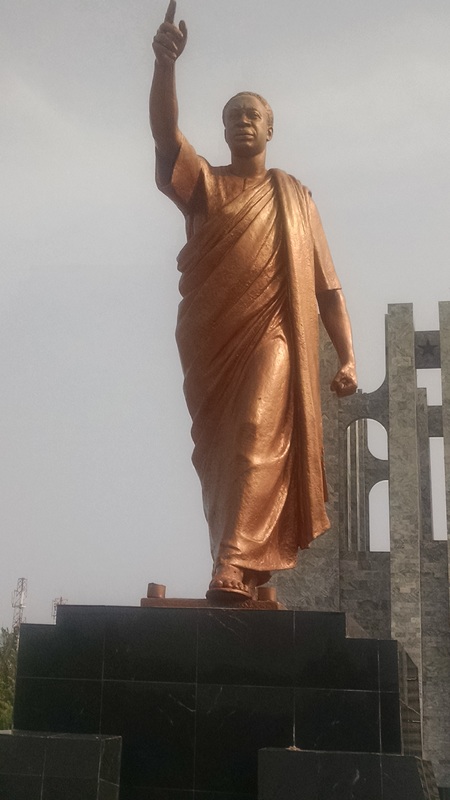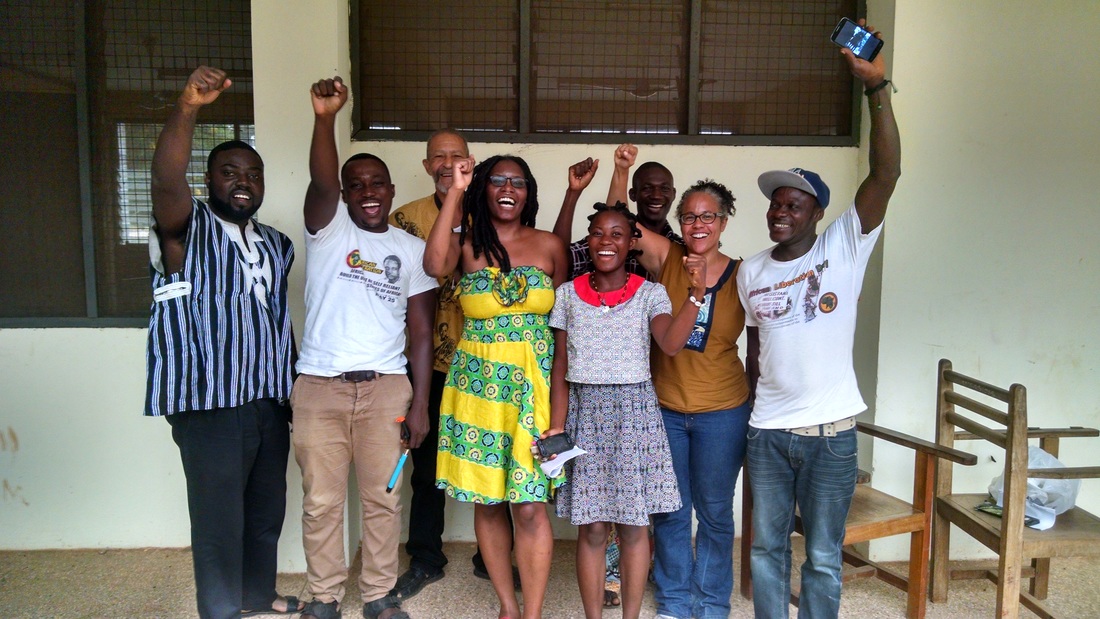Sekou Ture's contributions to our ideological direction deserve a focus of their own and have been, and will be explored in separate posts, but here I will focus specifically on the contributions of Kwame Nkrumah since I've just returned from Ghana where his contributions were initially manifested. Nkrumah was an impressive presence in the African revolutionary struggle. As other comrades have previously pointed out, although Marx never left Europe and he never actually organized a communist party, Nkrumah made significant organizational contributions on the ground in Africa, Europe, and the U.S. He participated in the African Phi Beta Sigma Fraternity in the U.S., the West African Students Association in Britain, and was a founding and leading member of the United Gold Coast Convention and later, the Convention People's Party in Ghana. Then, once he was forced to leave Ghana, he founded the A-APRP in Guinea-Conakry in 1968 ("Handbook of Revolutionary Warfare - Nkrumah 68). Nkrumah's work has earned him the title of father of Pan-Africanism and he continues to serve as the ideological leader for the African revolution.
The groundwork for Nkrumah's legacy is borne in his historical recognition that Ghana's independence as the first African country to advance past settler colonialism in 1957 was just a stepping stone to achieving true African liberation. Nkrumah's speech saying as much on the night of Ghana's independence illustrates his vision. And, his immediate work to make Ghana the base for the African revolution served to cement his commitment to this noble cause. Becoming one of the first Africans to recognize the need to eliminate the colonial geographical boundaries that divide us, he made an international call for Africans everywhere to come to Ghana to help make that country the base of the African revolution. Many Africans heeded his call. Significant contributors like the Trinadadian born George Padmore, who stayed in Ghana as an advisor to Nkrumah until Padmore's death. Adphaus Hunton, the African intellectual from the U.S. Maya Angelou, the great African artist from the U.S. all came to Ghana. Robert Mugabe, the founding member of the Zimbabwan African National Union was there as a student of Nkrumah. Patrice Lumumba from the Congolese National Movement was there. Support for liberation movements throughout Africa were established and aide from Ghana was provided to those movements. This was happening from Ghana before there was even the slightest suggestion of aide coming from the Soviet block countries. The weight of this work can be gauged several ways, one of which is by reading the words of Malcolm X who wrote in his autobiography; "the highest honor of my life was having an audience with Kwame Nkrumah in Ghana." Malcolm demonstrated his respect by naming his new organization the Organization of Afro American Unity after the Organization of African Unity that Nkrumah played a prominent role in founding in 1963. Going further, it should be stated how much Nkrumah influenced the U.S. civil rights and Black Power movements. Although few scholars credit him for such, Martin Luther King clearly stated how much attending Ghana's independence ceremony influenced him to advance the civil rights agenda and he cited Nkrumah's personal encouragement to him to do so in his book "Why We Can't Wait."
Of course, in February of 1966,. the Central Intelligence Agency (criminals in action) forced an illegal coup to overthrow the Nkrumah government in Ghana. This happened while Nkrumah was traveling to Vietnam to help broker peace in the war between Vietnam and the U.S. The CIA has had to come clean and acknowledge it's role in instigating the coup in Ghana as it has become quite clear that Ghana today is one of the CIA's main outposts in Africa. The coup was accomplished not just by the acts of criminals in 1966, but by a carefully coordinated campaign in the years leading up to the coup where Britain, playing the role of objective supporter, continued to levy it's control over technical expertise and resources, over Nkrumah's head in an attempt to direct the actions of his government. Much has been said of the corruption of the Convention People's Party in Ghana, but very little has been said about the lack of technical skills and political education which paved the way for the corruption. Nkrumah tried desperately to hold his political party together, but the reality is had Britain truly supported Ghana's independence, they would have provided the resources needed from the very beginning. And, that means all of the technical resources needed to build up Ghana's industrial infrastructure. Britain never did this. Instead they dangled a carrot in front of Nkrumah when it appeared he may look to the Eastern block for help and they used Ghana as a tool in the cold war with the Soviets. This was devastating to Ghana because having a lack of resources and skill to properly develop the country, they were forced to play Britain's game in the hopes that they would get what they needed. Britain, having benefited from exploiting Ghana's resources for decades, had a moral obligation to provide everything Ghana needed without cost. Of course, this was never going to happen because Britain was never really interested in true Ghanaian independence. These are the factors that have to be considered in order to make a proper assessment of Nkrumah's government in Ghana along with the misinformation that circulated accusing Nkrumah of stealing the government's resources. In fact, I had a conversation with a taxi driver in Ghana earlier this month where he accused Nkrumah of being a dictator. When I asked him what qualified Nkrumah for that title, he said Nkrumah gave Ghana's money away to causes when the money was needed in Ghana. He cited Nkrumah's support for the Congolese people during the crisis in the Congo in 1960 as an example. I told him I thought a dictator was someone who stole a country's resources, not someone who shared them with others in need? Especially when Nkrumah was operating on the premise that Ghana had no security unless Africa was also free and united.
This leads to Nkrumah being forced to go to Guinea which many people mistakenly call being in exile. Any African, anywhere in Africa, cannot be in exile. This is only possible if you accept the colonial borders which we will never do. So, Nkrumah was invited to Guinea by Sekou Ture. At first, Ture made the unprecedented move of offering the presidency of the country to Nkrumah, but Nkrumah indicated he could not accept that offer so Ture declared him co-president of Guinea. This makes Nkrumah the only person in human history to be president of two different countries. During his time in Conakry, from 1966 until his death in 1972, Nrkuamh researched and wrote his best works including "The Handbook of Revolutionary Warfare" and "Class Struggle in Africa." The "Handbook" manuscript he shared with a young Stokely Carmichael who read the entire book in one day. Carmichael enthusiastically told Nkrumah he wanted to carry out Nkrumah's call to create the A-APRP and the All African Committee for Political Coordination and the All African People's Revolutionary Army. Thus, the first work study circle for the A-APRP commenced in Conakry with Nkrumah, Stokely Carmichael, the Guinea Bissau revolutionary Pan-Africanist Amilcar Cabral, and Lamin Janga from Gambia. Nkrumah made his physical transition in 72, but Stokely Carmichael and a number of other activists, (including a number of former Student Non-Violent Coordinating Committee and Black Panther Party members who left the BPP and came into the A-APRP, some who are still active within the A-APRP movement today) continued to build the A-APRP. In 1977, Carmichael changed his name to Kwame Ture to give respect to Nkrumah and Sekou Ture who guided him through his revolutionary development. Kwame Ture spent the last 30 years of his life living in Guinea-Conakry building the A-APRP not just in Guinea, but throughout the African world.
Kwame Ture carrried Nkrumah's vision which we taken along with the concepts and ideas of Sekou Ture into our Nkrumahist/Tureist framework for African revolution. Today we are all over the African world organizing to build the A-APRP. We advance the ideas of Nkrumah which differ significantly from the ideas of Karl Marx and the other European revolutionaries. We believe in the concept of Philosophical Consciencism which we define as recognizing the primacy of matter instead of the absolute existence of matter. We recognize the role of the immaterial e.g. ideas, etc., and since spirituality is a central part of African culture, we do not agree with the Marxist emphasis on atheism. Instead, we subscribe to the passion of Ms. Fannie Lou Hamer who placed a shotgun in every room of her house in Mississippi and exclaimed that she prayed to God that she would have accuracy in shooting any "cracka" who tried to deny her the rights she deserved. We advance Nkrumah's notion of the mass political party where everyone is a member which is consistent with the collective character of African culture as opposed to the vanguard approach of European Marxist parties. And finally, we subscribe to the Revolutionary African Personality and the social revolution which inform us that our struggle isn't just a class struggle, but is a nation. class, gender, struggle which is defined by the ideological tenets that guide it and that ideology is a major aspect of all of this and without understanding the role of ideological struggle we will never truly win the war against our enemies.
These are just some of the contributions of Kwame Nkurmah to the struggle for African self determination and victory. Nkrumah himself disappeared 45 years ago, but his ideas are still being organized around everywhere Africans exist. His ideas guided the efforts of Qaddafi to create one African currency. His ideas are contributing to uprisings all over the African world from Bourkina Faso to the U.S. We encourage you to study the works of Nkrumah, and Sekou Ture, to gain an understanding of the ideas that guide the work of true revolutionary Pan-Africanists around the world.



 RSS Feed
RSS Feed
